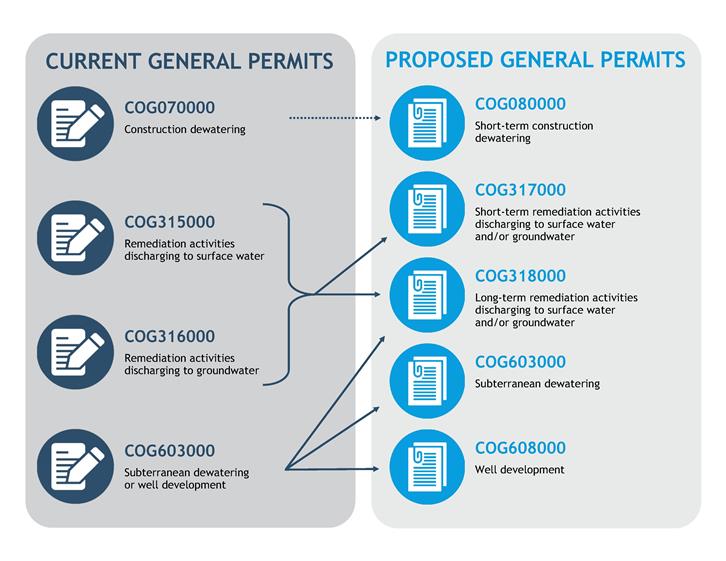Colorado Issues New Draft Dewatering and Remediation Permits
The Colorado Department of Public Health and Environment (CDPHE) has issued draft general permits addressing groundwater discharges for new and existing projects. As drafted, the new permits are likely to significantly impact new construction and existing buildings throughout the state. Public comments are due to CDPHE by Nov. 12.
The draft permits are meant to replace existing general permits that authorize and regulate discharges from groundwater “dewatering” systems used during construction and at many completed projects in Colorado. Typically, dewatering systems are used during construction to remove groundwater or a mixture of groundwater and stormwater that has collected onsite. Many projects also require continued dewatering after construction is complete to stabilize subsurface structures such as foundations, parking garages and elevator shafts. The CDPHE regulates and permits the discharge of these waters.
Which Permit Will Apply?

Source: Colorado Department of Public Health
Developers, property owners and property managers throughout the Denver metro area are already encountering high levels of naturally-occurring metals (such as arsenic, iron, manganese and selenium), making compliance with existing discharge permit limits exceedingly challenging, if not impossible. As currently drafted, the new permits will further challenge dewatering operations (regardless of whether they are in compliance with their current permit certification) because new effluent limits and permit terms and conditions may apply. The new permit regime would apply to existing permitted dewatering systems and may modify the regulatory liabilities of projects that are now in compliance with the current permits. Existing buildings with current dewatering operations may be given additional time to come into compliance with the new requirements, at CDPHE’s discretion. New construction projects or facilities nearing completion will be subject to the new requirements from the first day after the new general permits are instituted.
Not only project owners but also lenders, investors and purchasers should be aware of the potential increased compliance burden under the new permits as the additional compliance costs may be significant, depending on the property in question. Additionally, many covenants and representations in loan and purchase and sale agreements may be implicated as a result of noncompliance, creating significant legal ramifications for property owners. These parties should perform sufficient due diligence to ensure the properties they are purchasing, investing in or financing comply with existing permit terms and conditions and that they will be able to comply with the proposed permits.
Brownstein’s Real Estate and Natural Resource attorneys assist clients with short-term and long-term dewatering compliance and evaluating these risks in real estate transactions. Affected property owners and property managers are encouraged to submit comments on the draft permits before Nov. 12 and to seek assistance with due diligence in pending transactions.
This document is intended to provide you with general information regarding draft permits meant to replace existing general permits that authorize discharges from dewatering systems. The contents of this document are not intended to provide specific legal advice. If you have any questions about the contents of this document or if you need legal advice as to an issue, please contact the attorneys listed or your regular Brownstein Hyatt Farber Schreck, LLP attorney. This communication may be considered advertising in some jurisdictions.